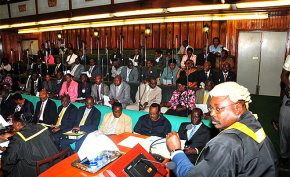
By SAMUEL MATEKHA SHIKHONGOLA
The 9th Parliament has so far debated and passed 8 bills for the period running from 1st January till the 19th November 2014.
This number of bills passed is a reflection of 65% decline as compared to the laws passed in the year 2013 where 23 bills were passed.
The bills passed in 2014 are; the HIV/AIDS prevention and Control Bill, the Supplementary appropriation bill, the excise duty bill, the income tax amendment bill, the Value addition bill, the Appropriation bill, the Finance bill and the Plant protection and Health Bill.
The fall in the number of passed bill comes at the time when parliament is faced with the challenge of the absenteeism of its members. This performance of parliament has been attributed to this absenteeism among other reasons.
A midterm performance report on the performance of Uganda’s 9th Parliament by Civil Society Organizations reveals that members of parliament had neglected their major role and resorted to other roles like mourning all the dead, promising the construction of roads and bridges, paying schools fees, organizing football tournaments in their constituencies among other self-created responsibilities.
This report was launched by the civil society organizations under the Uganda Government Monitoring Platform at Hotel African on the 9th September 2014.
The 1995 constitution of the republic of Uganda mandates the parliament under article 79 to make laws on any matter for peace, order, development and the good governance of the country. Under this the parliament is also assigned to conduct the following business on behalf of all Ugandans;
To provide, by giving legislative sanctions taxation and acquisition of loans, the means of carrying out the work of Government, scrutinise Government policy and administration through the: pre-legislative scrutiny of bills referred to the Parliamentary committees by Parliament, scrutinising of the various objects of expenditure and the sums to be spent on each, assuring transparency and accountability in the application of public funds.
Parliament is also authorized to monitor the implementation of Government programmes and projects, debate matters of topical interest usually highlighted in the President's State of the Nation address and to vet the appointment of persons nominated by the President under the Constitution or any other enactment.
Due to the very high level of absenteeism many of these functions have not been executed. According to Dr. Yasin Olum a Makerere University Lecturer, citizen’s ignorance of the MPs’ roles is another facilitator for the poor performance, the high levels of absenteeism and public demand for duties like mourning from their parliamentarians.
Gen. Moses Ali, the deputy leader of government business in parliament describes members who dodge parliament as fosters of corruption. He notes that at several occasions parliament fails to pass laws due to the absence of MPs. Gen. Ali adds that all MPs in a corrupt approach quickly receive a salary they have not worked for at the end of every month.
In the same spirit the inspector general of government Irene Mulyagonja asserts that the despite the rampant neglect of duty, absentee MPs continue receiving full salaries and entitlement. “This form of corruption seems to be gaining acceptance as normal” Irene Mulyagonja laments.
The 9th parliament comprises of ; 238 Constituency Representatives; 112 District Woman Representatives, 10 Uganda People's Defence Forces Representatives, 5 Representatives of the Youth, 5 Representatives of Persons with Disabilities, 5 Representatives of Workers and 13 Ex-officio Members. This brings the total number to 388 Members of parliament.
On many occasions the speaker of parliament has adjourned parliamentary seating due to lack of a quorum. In some cases laws bills are passed without the required quorum, key among these legislations is the Anti-Homosexuality Bill 2009. This law was nullified by the constitutional court sighting lack of quorum.
Citizens who attended the Mid-term performance report by civil society organizations and other member of the public interviewed decry the poor performance of their MPs, the increased absenteeism from the house, absence from committee meeting and also the absence from constituencies.
They demand that the speaker of parliament regularly raise the issue of participation and representation on the floor of parliament and ensure disciplinary measures are taken for absenteeism.
The IGG recommend a fine of absentee MPs. She a draws an example from the South African parliament whose leave and attendance policy requires Mps to pay approximately 250,000 Uganda shillings for each day of unauthorised absence from parliament.
Recently the speaker of parliament Hon. Rebbecca Kadaga forwarded names of Hon. Issa Kikungwe and Hon. Kaddu Mukasa to the parliamentary committee on Discipline and legal affairs for action after they had appeared in parliament for over 15 seating.
Article 84 of the constitution allows the recall of a member of parliament for misbehaviour and persistent desertion of their electorate. The same law give duration of 15 times of missing parliament without authorization from the speaker.
Two former members of parliament, Hon. Tonny Nsubuga Kipoi and Hon. David Sejusa have been victims of this law. They were expelled from the house because of absenteeism.
The practise is however growing by day as the term for the 9th parliament runs to end in 2016.
The author is an MA student at the Department of Journalism and Communication
- Log in to post comments




